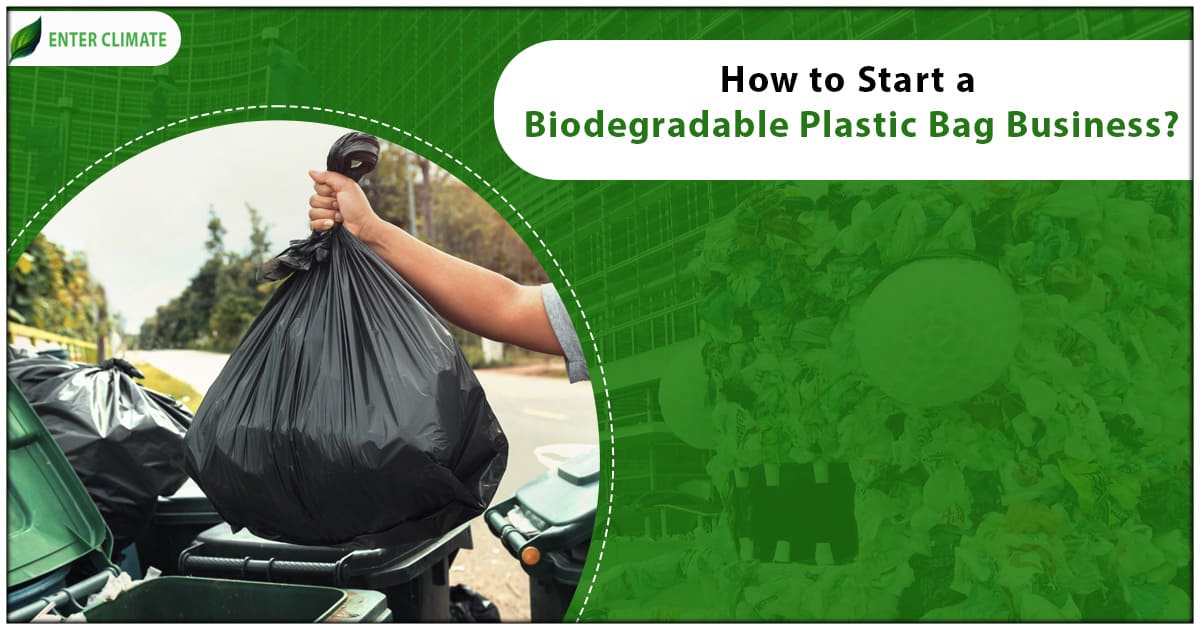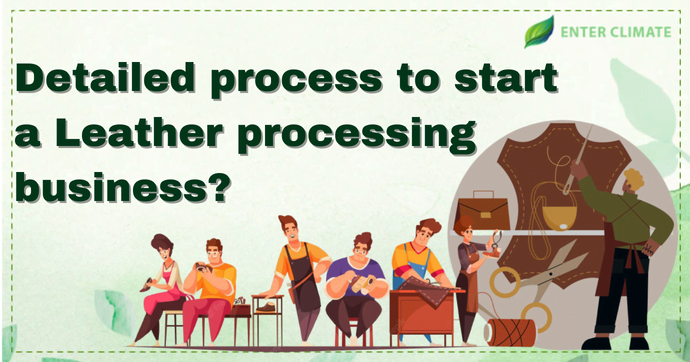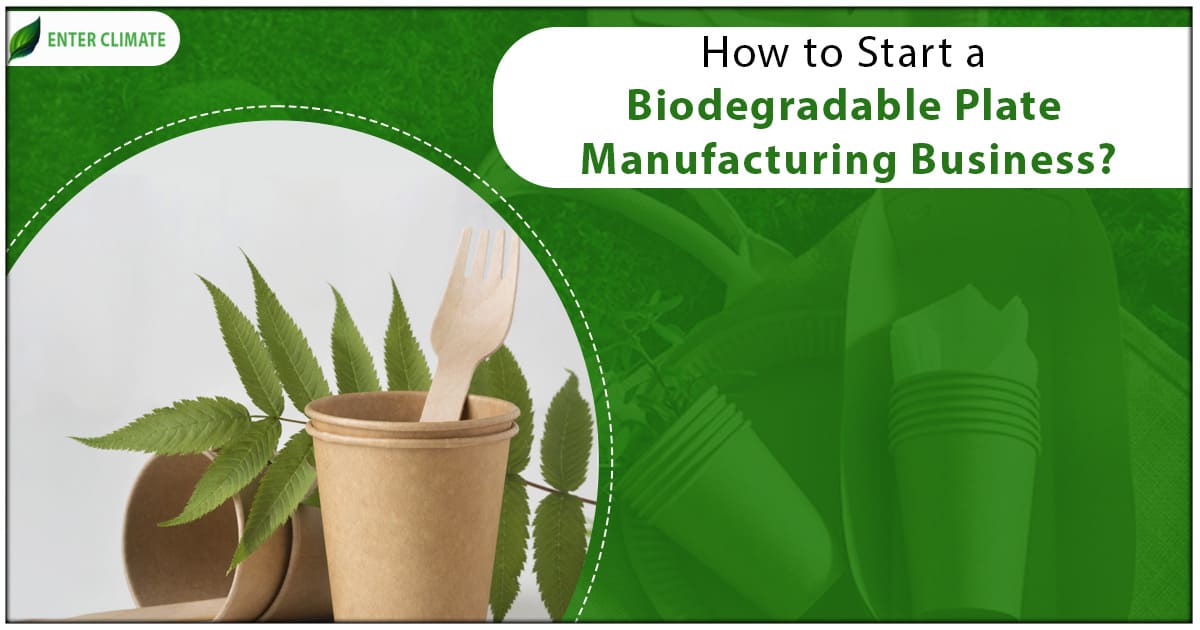How to Start a Biodegradable Plastic Bag Business?
 28 Jun, 2023
28 Jun, 2023 
The Indian government, in 2022, had declared a ban on single-use plastics that has taken effect from July 1, 2022. This created significant new prospects for entrepreneurs to tap into a vast market that was created due to the ban. Numerous establishments, including restaurants, groceries store, and convenience stores that earlier handed out their products in plastic bags, have already embraced using biodegradable/ Compostable plastic bags. This write-up will provide comprehensive insights into setting up a Biodegradable Plastic Bag Business to help you take advantage of the prevailing market conditions and address the increasing demand for eco-friendly alternatives.
“Compostable plastic”[1] as defined in Rule 3(e) of PWM Rules, means “plastic that undergoes degradation by biological processes during composting to yield CO2, water, inorganic compounds and biomass at a rate consistent with other known compostable materials, excluding conventional petro-based plastics, and does not leave visible, distinguishable or toxic residue.”
Factors Responsible for Growth in the Biodegradable Plastic Bag Market
A combination of the below-mentioned factors has established the biodegradable plastic bag business as a highly profitable manufacturing sector.
- Imposition of bans on plastic bags and various single-use plastic items.
- Growing consumer awareness regarding sustainable plastic alternatives.
- Government initiatives aimed at reducing reliance on petroleum-based products.
- Increasing demand for environmentally friendly packaging solutions from industries such as textiles and food packaging.
- Negative impacts associated with plastic waste.
How to start a Biodegradable Plastic Bag Manufacturing unit
Knowledge of designing compostable raw materials from the list of approved biodegradable materials that can give your finished product the plastic bag-like property is required while starting a biodegradable plastic bag business. Therefore, along with the technology, the standard operating procedure (SOP) released by CPCB for compostable plastic bag manufacturers and sellers must also be conformed to. There are some popular varieties of biodegradable plastic bags in demand in today’s market, including.
- Polylactic Acid (PLA)
- Polyhydroxyalkanoate (PHA)
- Starch blendsCellulose-based bags
- Other varieties
The stages of starting the business will include the following
Machinery Requirement for Biodegradable Plastic Bag Business
- Extrusion Machine: The extrusion machine moulds compostable granules into film shapes. Extruders and two machine heads are employed to blow high-density polyethene (HDPE) and low-density polyethene (LDPE) plastic films. These films are then transformed into flat and vest bags, which find packaging applications in the textile and food industries.
- Sealing and Cutting Machine: The sealing and cutting machine is used to precisely cut or seal biodegradable plastic bags according to the desired design and size requirements.
- Printing Machine: The printing machine imprints the company name, logo, and chosen colours onto the biodegradable plastic bags. This process plays a crucial role in enhancing brand awareness and recognition.
- Biodegradable Plastic Bags Raw Material: The production of biodegradable plastic bags involves using compostable plastic granules as the primary raw material. These granules are derived from natural polymers and starch, making them environmentally friendly. They naturally decompose, further enhancing the eco-friendliness of the biodegradable bags.
- Required Area: To initiate a small-scale biodegradable plastic bag manufacturing business, a minimum area of approximately 900 square meters is needed.
- Electricity and Manpower: The production of biodegradable bags requires an electricity supply ranging from 40 to 50 kilowatts. A workforce of eight to nine individuals is also necessary to operate the manufacturing process.
Manufacturing process of Biodegradable Plastic Bags
Compostable plastic granules are utilized as the raw material and fed into a hopper, where they are melted into a liquid form. The liquid is transformed into a film or sheet using an extrusion machine and then rolled onto a rod. A printing machine imprints the company name, logo, and other desired elements onto the plastic bag. A cutting and sealing machine are used to cut and seal the bag accordingly to achieve the desired size and design.
Verification Test between Compostable Plastic and Conventional Plastic
The verification test between Compostable Plastic bag and Conventional Plastic is as follows:
| S No | Experiment | Observation | Inference |
| 1 | Take Dichloromethane (DCM) in test tube and then dissolve 2×2 cm film sample or few granules in Dichloromethane (DCM) | Dissolution of samples | Confirm the presence of PLA and PBAT [PE and PP will not undergo dissolution.] |
| 2 | Dissolve 2×2 cm film sample or few granules in boiled xylene | Dissolution of samples | Confirm the presence of PE and PP [PLA and PBAT will not undergo dissolution.] |
| 3 | You can also immerse few granules of sample in distilled water at ambient temperature | Float/Sink | Samples made from PLA and PBAT will sink whereas samples made from PE and PP will float on water. |
Required Licenses for Biodegradable Plastic Bag Business
Licenses Required to Start Biodegradable Plastic Manufacturing Business:
- Registration for Goods and Services Tax (GST)
- EPR Registration
- UDYOG Aadhar registration
- Registration with the State Pollution Control Board
- Manufacturing Certificate from the Central Pollution Control Board (CPCB)
- Obtaining a Pollution NOC from the concerned State Pollution Control Board
Note: Compostable plastic bags are required to obtain registration from SPCBs/PCCs. However, Compostable Plastic Bag manufacturer are not required to submit an action plan for collection of plastic waste as the waste will disintegrate by itself.
Benefits of Starting a Biodegradable Plastic Bag Business
- Biodegradable bags can quickly decompose.
- They are recyclable
- Reduces reliance on petroleum
- Helps reduce carbon footprint
- Biodegradable plastic is non-toxic
- Cost-effective alternative
Market Overview and Potential of Biodegradable Plastic Bags
The biodegradable plastic bags industry is experiencing rapid growth, fuelled by stringent regulations and the ban on traditional plastic bags. The global market for biodegradable plastic bags was valued at USD 2.8 billion in 2020 and is projected to reach USD 8.6 billion by 2026. Today these biodegradable plastic bags are used in various industries, including:
- Textile industry
- Food packaging
- Shopping purposes
- Punnets for fruits, vegetables, and meat
- Garbage collection
- Toys
Conclusion
Starting a biodegradable plastic bag business can be lucrative with the increasing demand for eco-friendly products and the growing awareness of environmental sustainability. To embark on this business journey, it is crucial to have a solid business plan in place, considering factors such as manufacturing costs, raw materials, required licenses, and target markets. Collaborating with local shops, supermarkets, and other establishments can help establish a customer base. Additionally, staying updated with advancements in biodegradable plastic technology can contribute to cost efficiencies and market competitiveness. By providing a sustainable alternative to traditional plastic bags, entrepreneurs can contribute positively to the environment while running a profitable business.It is recommended to take expert advice to obtain licenses and approval for starting a Biodegradable Plastic Bag Business hassle-free way.
FAQ
Toinitiate a small-scale biodegradable plastic bag manufacturing business, an approximate investment of 60 lakhs rupees is required.
The biodegradable bag business is profitable due to consumers’ increasing demand for eco-friendly products. This has resulted in a surge in demand, making the biodegradable bag business profitable.
InIndia, biodegradable plastic costs approximately ₹260 per kg. With ongoing technological advancements, it is anticipated that the cost of biodegradable plastic will decrease, benefiting both manufacturers and consumers.
Starting a biodegradable plastic bag business is important as it directly contributes to reducing environmental pollution caused by traditional plastic bags. Biodegradable plastic bags are designed to decompose naturally, minimizing their impact on landfills, oceans, and ecosystems. By offering an eco-friendly alternative, the business helps preserve natural resources and mitigate the harmful effects of non-biodegradable plastics on the environment.
Compostable plastic granules are utilized as the raw material and fed into a hopper, where they are melted into a liquid form. The liquid is transformed into a film or sheet using an extrusion machine and then rolled onto a rod. A printing machine imprints the company name, logo, and other desired elements onto the plastic bag. A cutting and sealing machine is used to cut and seal the bag to achieve the desired size and design.
Read our Article:How To Start A Biodegradable Cutlery Business Based On Rice Husk?
Categories
Latest Post
Air pollution Dispersion Modeling
Natural Disaster Risk Assessment
Endangered Species Protection
Aquifer Recharge Project
Sustainable Sanitation Solutions














